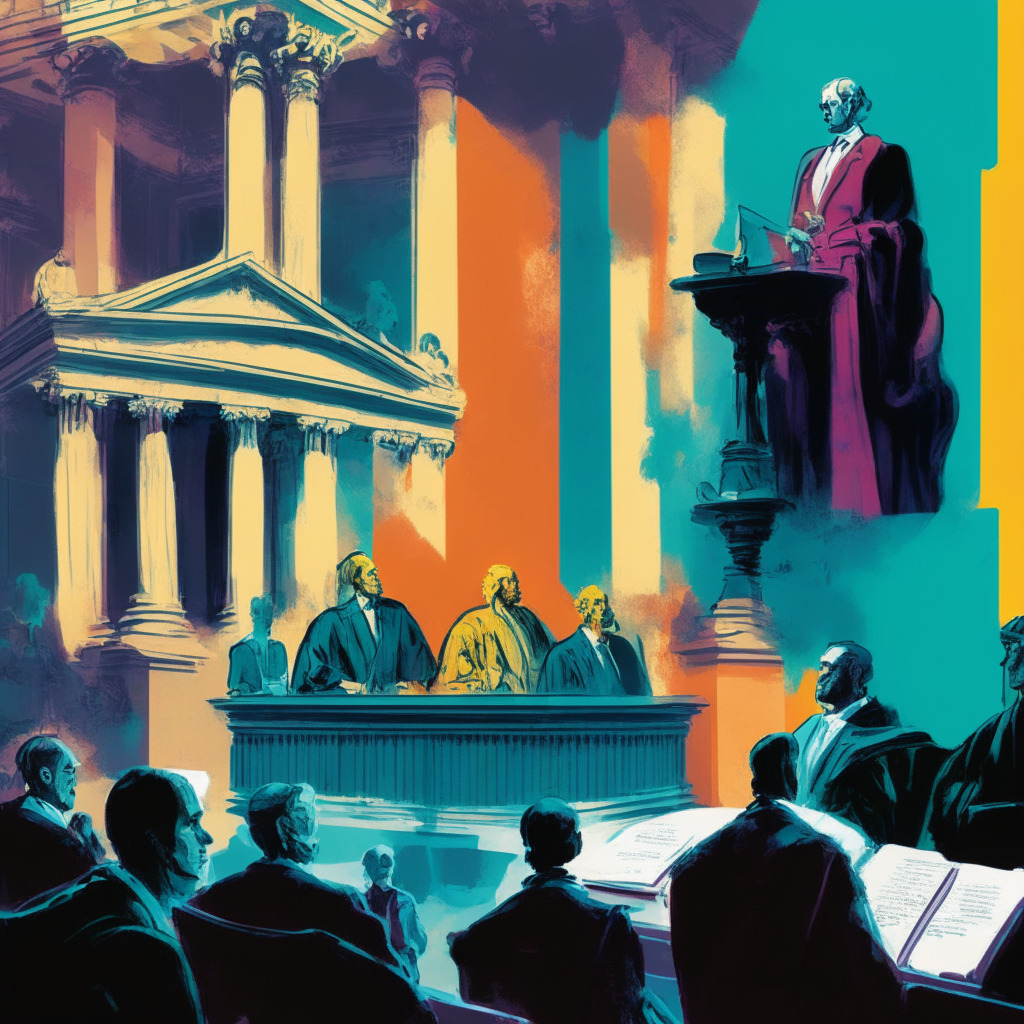“Cryptocurrency circles discuss Grayscale’s lawsuit and SEC chair Gary Gensler’s role. Congressman Warren Davidson suggests Gensler’s SEC decisions lack stead, as demonstrated by Grayscale’s legal victory. This opens up possibilities for a Bitcoin spot ETF emergence in the US, but the situation remains uncertain.”
Search Results for: Gary
Federal Court Ruling on Bitcoin ETFs: A Setback for SEC or Forward Leap for Crypto Industry?
The U.S. Securities and Exchange Commission (SEC) must reconsider its stance on bitcoin spot ETFs following a court victory by Grayscale Investments. The SEC has four options, but the course of action it takes could set a precedent for future crypto projects. It’s crucial that the SEC finds a balance between embracing cryptocurrency and ensuring investor protections, without stifling innovation.
Redefining the Crypto Landscape: The Impact of US Court’s Ruling on Bitcoin ETFs
The U.S. Court of Appeals’ recent ruling criticizes SEC’s denial of a bitcoin spot-market ETF as “arbitrary” and “capricious”, fuelling hope for future acceptance. Grayscale Investments’ push for the Grayscale Bitcoin Trust’s transition into an ETF could force SEC to reconsider past rejections.
Cryptosphere Tremors: BitBoy Crypto Decouples from YouTuber Ben Armstrong – Impact & Implications
“The ‘BitBoy Crypto’ brand is parting ways with popular YouTuber Ben Armstrong, citing issues of substance abuse and accusations of damage to network employees. This decision raises questions about the brand’s future and the influence of its key figure.”
The Tug-of-War: Hashdex’s Unique Bitcoin ETF Filing and its Potential Implications
“Hashdex, a crypto asset manager, has filed an application with the US Securities and Exchange Commission for a Bitcoin futures ETF. Unlike previous filings, Hashdex plans to hold actual spot Bitcoin within the CME market. Experts anticipate this could boost digital asset adoption by improving accessibility.”
Navigating Bitcoin’s Unsteady Path: Influence of SEC Regulations and Fear of Inflation
In this article, we explore the recent 10% drop in Bitcoin value, critiqued regulatory methods of the US’s Securities and Exchange Commission and its influence on Bitcoin’s price fluctuation. A looming economic disaster by Federal Reserve policy mishaps is also cautioned, potentially influencing the future trajectory of Bitcoin.
Caught in the Crosshairs: Titan Global Capital and an Expensive Lesson in Crypto Compliance
The US Securities and Exchange Commission (SEC) accused Titan Global Capital Management of deceiving investors regarding cryptocurrency offerings, leading them to part with over $1 million in a settlement. This instance underscores the SEC’s increased focus on regulatory compliance within the digital assets industry, potentially indicating impending tighter regulations affecting customer custody and information accuracy for cryptocurrency firms.
Decoding the Bitcoin Downturn: Is It a Bubble Burst or a Market Adjustment?
“The recent crypto market plunge differs starkly from previous instances. While Bitcoin’s futures premium started higher, exceeding the 5% neutral threshold, this derivative market shock was rapidly absorbed. The return of BTC futures rates to a 6% neutral-to-bullish position suggests that the drop didn’t dampen market optimism, reducing the likelihood of prolonged price correction.”
Breaking Tradition: Rethinking Investment Contract Definitions in Coinbase vs SEC Dispute
A consortium of U.S. law scholars are supporting Coinbase in its dispute with the SEC, arguing the SEC’s understanding of “investment contract” may be flawed. This dispute accumulates around aligning blockchain technology with evolving regulatory frameworks and interpretations. The outcome could set a precedent for future crypto regulation.
Shifting Political Winds: Potential Impact on US Crypto Regulatory Landscape Post 2024 Election
Recent comments from former SEC official John Reed Stark suggest potential changes to U.S. crypto regulation influenced by party politics. Stark attributes a pro-crypto regulation shift to a possible Republican win in 2024, ending current SEC chair Gensler’s tenure, and potentially paving the way for Hester Peirce, known for her softer stance on crypto.
Redefining Boundaries: SEC, Coinbase Lawsuit, and the Call for Crypto Regulation Reformation
U.S. Senator Cynthia Lummis and crypto experts assert that the SEC’s examination of crypto trading platforms, like Coinbase, as unregistered securities exceeds their jurisdiction. The SEC’s authority question, they believe, should rest with Congress. Much debate exists around immediacy and breadth of crypto regulation, with an emphasis on establishing comprehensive, globally mindful approaches to build trust in the market.
NFTs and Art Collecting: Challenging the Conventional Paradigm with Mystery Artists
“Art collecting sees a shift with NFTs disrupting conventional paradigms and putting emphasis solely on art, not artists. Through blockchain technology, tokenized art is promoting unique speculative tendencies among collectors. Companies like Amazon Prime are also marking their entry into the NFT realm.”
The SEC’s Crypto Crackdown: Necessary Oversight or Innovation Barrier?
“Bittrex agreed to a $24 million settlement following SEC allegations of operating as an unregistered securities exchange, part of an acceleration of SEC’s enforcement on disruptive crypto firms. The aggressive regulation is critiqued for thwarting investment and innovation, pushing the industry to more amiable jurisdictions like UAE or UK.”
Regulatory Tango: Analysis of the SEC Vs. Ripple Labs and Future Implications on Crypto Regulations
The ongoing case between the SEC and Ripple Labs involves a potential $1.3 billion unregistered securities offering. Recently, Judge Analisa Torres ruled that Ripple’s XRP sales didn’t qualify as securities offerings. However, the SEC plans to appeal this decision, indicating the complex and evolving landscape of blockchain regulation.
Emerging Trust in Bitcoin: Financial Giants are Getting Onboard with Cryptocurrency
David Rubenstein, founder of the Carlyle Group, expressed confidence in Bitcoin’s future and its increasing importance in financial assets. His views underscore the growing interest from major firms in Bitcoin and its acceptance as a regulation-free virtual currency.
Harnessing Blockchain for Crime-Busting: Canada’s Progressive Approach and Privacy Concerns
Canadian law enforcement is utilizing the Chainalysis Reactor software to trace cryptocurrency crimes, adding a significant layer of accountability to the digital asset world. This technology reviews transaction patterns and tracks digital currencies to illegal activities, aiding investigations significantly. Despite potential criticisms of overregulation and privacy concerns, this marks noteworthy progress.
The Great Swindle: FTX’s Co-CEO’s Guilty Plea and Its Fallout on Crypto Transparency
Former co-CEO of FTX Digital Markets, Ryan Salame, is expected to plead guilty to suspected violations of U.S. campaign finance laws linked with illicit activities within the cryptocurrency firm. Sam Bankman-Fried, FTX founder, maintains his not guilty plea against charges including multi-billion dollar fraud. This underscores the urgent need for transparency in financial cyberspace.
Billionaire’s Belief in Bitcoin’s Bright Future: Revisiting Skepticism amidst Institutional Embrace
David Rubenstein, billionaire and co-chairman of Carlyle Group, recently expressed his belief that Bitcoin is here to stay, largely due to increasing institutional interest. He uses BlackRock’s plans to introduce a Bitcoin ETF as a primary example, suggesting the growing attention towards cryptocurrencies may lead sceptics to reconsider their stance.
FTX Digital Markets Scandal: The Tightrope of Crypto Regulations & Need for Decentralization
“FTX Digital Markets’ co-director, Ryan Salame, is negotiating a potential guilty plea regarding criminal charges stemming from the downfall of the cryptocurrency exchange. Salame is accused of violating campaign finance laws, posing questions about the future of blockchain technology and the need for stringent regulations within the platform.”
Navigating Crypto Future: CoinGecko’s New Category for SEC-Recognized Securities
CoinGecko, a leading cryptocurrency data aggregator, has introduced a “Top Alleged Securities Coins” category featuring crypto assets classified as securities by the U.S. Securities and Exchange Commission (SEC). The section, which includes coins like Binance Coin, Cardano, and Solana, helps users navigate the complex regulatory environment surrounding digital assets.
Interplay of Regulatory Oversight and Crypto Growth: A Closer Look at the CoinGecko Index
CoinGecko, a trusted cryptocurrency data platform, has launched an index delineating the largest crypto tokens classified as securities by the US SEC. These coins amount to a whopping $84.9 billion of the total crypto market, approximately 7.5% of the total capitalization. This reveal incites ongoing conflict between crypto industry and regulatory bodies.
Brawn and Bots: Perils and Potential of Today’s NFT Marketplace
A trader outsmarted a bot into buying his overpriced NFTs, gaining a lucrative 800 ETH ($1.5 million). This strategy has sparked conversations about its legal implications. Meanwhile, July saw a decrease in NFT volumes, causing concern among creators. Despite this, Gary Vaynerchuk recently entered the NFT space, partnering with Reebok.
The Ethereum ETF Rush: Bright Prospects Tempered by Regulatory Uncertainties
“The world of Ether is gaining significant attention with 11 Ether ETF applications recently submitted to the SEC. ProShares’ proposal for an ETF tracking both Bitcoin and Ether futures contracts is particularly exciting. However, the SEC has never approved an ETF tracking Ether futures, introducing uncertainty into the situation.”
Wreck League: Animoca Brands’ Next Spectacle in Web3 Gaming and NFT Market Activities
“Wreck League”, a new NFT-based game is set to launch by the house of Animoca Brands and its subsidiary, nWay. The game allows players to create mech characters from collectible NFT components. It will also include a free-to-play Web2 version accessible across multiple platforms, and also provide the opportunity for players to compete for on-chain valuables.
Exploring BALD Coin Controversy: Is SBF the Mysterious Mastermind or an Innocent Bystander?
A recent controversial revelation links Sam Bankman-Fried (SBF), the alleged mastermind behind the BALD memecoin that humorously refers to Coinbase CEO Brian Armstrong. After BALD’s dramatic initial trading gain, an 85% price drop sparked allegations of a ‘rug pull’. Blockchain enthusiasts link the Ethereum wallet behind BALD’s deployment to SBF with evidence showing substantial funds transfers from FTX and Alameda Research-associated wallets. However, amid these rumors, the crypto community awaits concrete proof before drawing conclusions.
Resurrecting FTX: Offshore Hope or Discriminating Revival?
Defunct crypto exchange FTX, is planning to potentially restart its platform but only for offshore customers. The plan, which excludes onshore users, involves dividing creditors into several categories and using stakeholder negotiations to decide the order of debt repayments. Dotcom customers of the now insolvent FTX.com could merge their assets, creating an offshore exchange company. However, FTT token holders won’t receive any distributions under the proposed plan, raising concerns among stakeholders and sparking contrasting opinions in the crypto community.
Unregistered Securities Offerings: Examining Richard Heart and Crypto Market Pitfalls
Crypto enthusiast Richard Heart, real name Richard Schueler, is accused by the SEC of raising $1 billion in unregistered securities offerings and misusing funds intended for his projects, Hex, PulseChain, and PulseX. His alleged luxury purchases with investor funds violated federal securities laws. Amidst this, the SEC is pushing for heightened crypto industry oversight in 2023.
SEC Versus Crypto: Portrayal of Double Standards and Its Impeding Impact on Innovation
Pro-XRP lawyer, John E. Deaton, criticizes the SEC’s approach to cryptocurrency regulation, stating it favors corporate capitalism over protecting individual investors. He argues that this could potentially hinder the growth and innovation within the budding cryptocurrency industry.
Unlikely Alliances and Divisive Lines: When Crypto Regulations Meet Freedom of Decentralization
The Bank Policy Institute (BPI) sides with Senator Elizabeth Warren to tighten cryptocurrency regulations via the Digital Asset Anti-Money Laundering Act, causing contention with crypto veterans. The bill requires enhanced surveillance and customer identity tracking, while banning digital asset mixers in efforts to prevent illicit activities. This raises questions about the balance between regulation and market freedom in cryptocurrencies.
Unraveling SEC’s Cybersecurity Disclosures: Balancing Investor Trust and Corporate Burden
The Securities and Exchange Commission (SEC) has directed all listed entities, including cryptocurrency enterprises, to annually disclose their “cybersecurity risk, management strategy, and governance.” Firms need to report major cybersecurity incidents within four days, elaborating on the attack’s nature and timing. The new regulation is introduced to fortify investor trust and encourage companies to adopt stringent cybersecurity measures.
Striking a Balance: Implications of New SEC Cybersecurity Disclosure Regulations on Crypto Firms
“The SEC has ruled that significant public firms, such as cryptocurrency companies Coinbase, Marathon Digital, and Riot Blockchain, must disclose major cybersecurity breaches within four days. This rule signifies an intensified blend of finance, tech, and cybersecurity in our digital age, though concerns have been raised about feasibility and potential operational burdens.”
Navigating the Crypto Landscape Amid Regulatory Tumult: A Case for Proactivity and Diligence
“Amidst regulatory uncertainty, the cryptocurrency sphere calls for a more pragmatic approach grounded in know-how and thoughtful consideration. Adopting a traditional finance framework for cryptocurrencies, a focus on due diligence initiatives, and regulatory technology (regtech) are crucial. Prioritizing fraud prevention is non-negotiable for trust and credibility in the expanding crypto ecosystem.”































